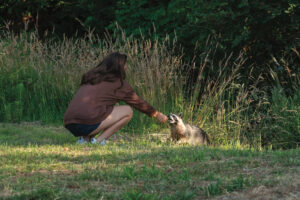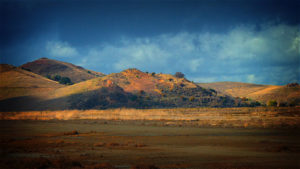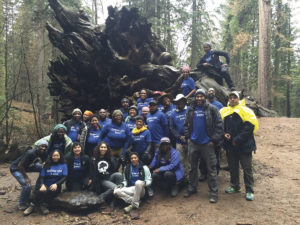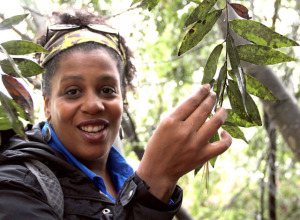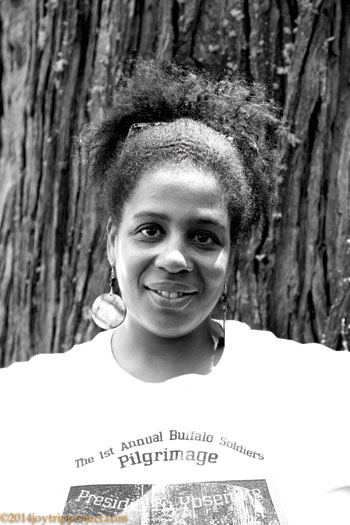
Since its inception in 2009, Outdoor Afro has been a leader in inclusive outdoor engagement. In the last 11 years, a lot has changed. We sat down with founder and CEO Rue Mapp to talk about what’s new, what’s surprising, and how Outdoor Afro has been able to weather the storms that have come its way — including a new and unprecedented challenge in the form of the COVID-19 virus.
Sonya Pevzner: Hi Rue! Thanks for talking to me today. The reason you’re on my mind is that I saw the news of how Oprah came and hiked with you in the redwoods. It got me thinking how much has changed in the outdoors community with regard to diversity since Outdoor Afro’s inception 11 years ago. I wanted to circle back and see how Outdoor Afro has been doing and what’s changed. You were one of the first people do this kind of thing on a national scale. How has that journey been?
Rue Mapp: Thank you for the recognition. I’m happy that people are talking about equity, and we’re talking about access, and that there’s greater visibility and incorporation of the topic in the outdoor industry, not unlike many other industries. I think the outdoor industry, because it’s so young, is right on time [for this conversation]. The industry has always understood [marketing to diverse groups of people], at minimum, as a market opportunity, and we have to just be clear about what America looks like. It’s fundamental business sense to make sure that whatever you’re doing can include the widest spectrum of audience within your brand’s offerings.
We were born in 2009. Before that there really wasn’t a national conversation. We were using social media, which was also a really nice and cheap way to talk about [the growing interest in getting folks outside]. It gave me this chance to have this kitchen-table conversation with hundreds of thousands of people. As one individual with one vision, that was a really unprecedented way to connect with people. I was able to grow this audience in a real organic way, to have the [in-person and on-trail] conversations grow from this digital conversation of narrative shifting and visual representation.
We have really understood that there’s universality in being specific. Outdoor Afro is focused on reacting to a black American experience in nature, and how that history is shaped, who we are, and how we connect with nature today.
Now, we have a not-for-profit organization that cultivates leadership and takes people into many types of outdoor experiences. We decided to work with the outdoor industry back in 2012 because it gave us some opportunities to learn, but also opportunities to share these new narratives that we were cultivating. I just think it’s so important that we make clear that Outdoor Afro was not born from, or in service to, the outdoor industry. We have really understood that there’s universality in being specific. Outdoor Afro is focused on reacting to a black American experience in nature, and how that history is shaped, who we are, and how we connect with nature today. We get to continue to amplify and talk about and stand on the shoulders of the champions of the past in everything that we do. As the conversation has continued to grow and expand in some really interesting and fun directions, some include Outdoor Afro — and some do not. And that’s OK, too.
Sonya Pevzner: I appreciate you bringing up that Outdoor Afro was not founded in service to the outdoor industry. It’s important to circle back and to be clear about where the priorities are. It’s to serve your own communities. If the outdoor industry wants to come along — great. But what you do is not for them.
Rue Mapp: My biggest responsibility is making sure I grow a healthy organization that can be an employer for people who want to join in this work in some way. Not to be a pipeline for any predominately white organization. Oftentimes people come fresh out of their strategic plans with an interest in working with us. But oftentimes those requests are misguided by an expectation that we’re here to solve a diversity problem for your organization. And we’re not. That’s where the specificity of what we do is so important. Outdoor Afro is like a quilt or a patchwork knit together with other organizations and causes and policies and platforms that altogether make up a story of protecting vulnerable people and vulnerable places for the betterment of all.
Sonya Pevzner: You were talking about how when you started it in 2009, it was kind of an open opportunity. Nobody had really done something similar. Do you think it’s harder to start a similar organization now? And how has the playing field changed since 2009?
Rue Mapp: It’s not harder, just different. The organization that we created was one that grew and has been strengthened through time, and that has informed trust and real relationships. And now, people have come to understand and see that we made good on our promises.
The other piece is the ways that Outdoor Afro has been really been rooted in community organizing and business acumen. I have a background in business, and I’ve started a couple of businesses. I bring a lot of understanding about business development, generating revenue, marketing, branding, communications. Those are the things that we really bring in or cultivate in order to be successful, especially in an environment where it’s a lot more competitive to be heard among many voices. We have to rely on data in ways today that we didn’t have to before. Whereas before we could be charismatic, or inspirational, now we have to make sure that we’re pairing that with good data that shows we’re clear about market trends and the environmental impact of what we do. I invite anybody to join in, but I would encourage folks to shore up their business rigor, even if they’re in a not-for-profit organization. You need to have a really strong business acumen that understands and pursues diversification of revenue and earned income. It’s not enough to just stand up for a demographic and champion that. We also want to be able to be in a position to create professional, durable opportunities for people — that’s really what the future of Outdoor Afro is for me.
Sonya Pevzner: That’s also a function that it serves for you. You’re the CEO, and it’s your primary source of income. You’re not doing this as a volunteer position.
Rue Mapp: It’s so interesting because to this day, I still get people who will say, well, what do you really do for a living? Because we do not have models out there that show people doing well and doing good in this sphere [of the established outdoor industry]. I really would love to see more executive leadership as well as practitioner leadership. Our job is no longer about getting more people who look like me outside. It’s more about, “How do I make this more visible to people who look like me, who are already doing it?”
I have not seen more people outside in parks, ever. And so I think that the visibility and priority for people to get outside and enjoy nature is not going to be lost on folks after this experience of having to be indoors.
Sonya Pevzner: What has surprised you in your journey with Outdoor Afro over the last 11 years?
Rue Mapp: By 2012, I’d learned a lot about conservation and policy and communications and storytelling. And I wanted to download everything that I’d learned to other people around the country, recognizing that the black experience in Oakland is very different than that of New York or Arizona or Atlanta. I needed to help people to sprout their own communities with this knowledge and help people get out and be empowered to get out into nature. The first year we had about 12 people who said yes, and we got maybe 500 people out. I thought that was a huge accomplishment. I brought on staff who worked with me to help me grow that team. Over the years, I was able to grow that team to nearly 90 people who now represent about 30 states. Now we have this participation network that’s about 40,000 people. People really want to work with us. I want to honor that desire so that people can participate in a variety of levels, no matter where their professional or personal interests may lie. The people who do our partnership, social media, program oversight — these are all people who came from within our network, who were homegrown.
Sonya Pevzner: How do you think that COVID-19 and the current situation in our country are going to affect Outdoor Afro? How is it going to affect just the country’s ability to come together outdoors in general?
Rue Mapp: It’s hard to say right now. Everything, as you know, changes from day-to-day. I mean, I have not seen more people outside in parks, ever. And so I think that the visibility and priority for people to get outside and enjoy nature is not going to be lost on folks after this experience of having to be indoors. And I think that it’s going to create a more meaningful and better-understood value around the need for people to be out in nature. And I think that’s going to also help people to better understand our park infrastructure, which has been stretched to its limits. I hope we won’t be in a permanent state where we cannot convene as groups, because it’s part of our humanity to be able to be in community. And I just think that if we can’t do that, then we have much bigger a bigger problem.
With Outdoor Afro, the thing that I’m thankful for is that we yet again have been able to lean into our work, which is nature and community. When there were riots in the streets after Ferguson, I decided that we were going to do healing hikes. We turned to nature as a place of solace and reverence and respect for how African Americans have always known we can lay down our burdens by the riverside. It’s needed as people understand that need for health and for connection and to be made aware of something bigger than the present moment. When I’m out in my backyard, I still see the same birds that were there before a shelter in place and that will be there, after. Or my lazy pitbull laying out under the sun. You know, these are the things that remind us and ground us in something much bigger than this moment that we’re in.
Sonya Pevzner: Last question: what’s your favorite thing to do outside?
Rue Mapp: Well, aside from, you know, being in community with people outside, I love being on the river. One of my favorite places is the American River in the Sierra foothills in the summertime when I take about 50 to 60 people with me up there. I get the chance to always keep my humility about being a leader in nature while also being able to enjoy something that’s deeply personal. It’s a place where I take my children and I take my children’s friends. For me, it’s always been about nature and community. I don’t feel like we have to choose one or the other.

